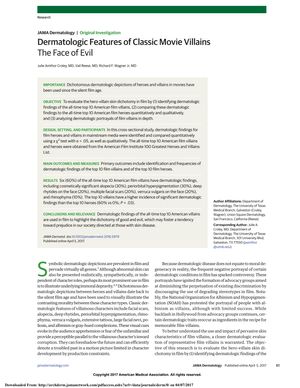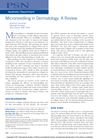Dermatologic Features of Classic Movie Villains
April 2017
in “
JAMA Dermatology
”

TLDR Most classic movie villains have skin conditions, unlike the heroes, which may cause bias against real people with similar conditions.
In the 2017 study examining the dermatologic features of classic movie villains, researchers found that 60% of the top 10 villains from the American Film Institute's list had noticeable skin conditions, including alopecia, periorbital hyperpigmentation, deep facial wrinkles, facial scars, facial warts, and rhinophyma. This contrasted with the top 10 heroes, who had no significant dermatologic findings. The study highlighted that these features in villains might contribute to societal prejudice against individuals with skin diseases, as they visually emphasize the contrast between good and evil. The study's design was cross-sectional, and the chi-square test was used for quantitative comparisons, with a significance level of <.05.


